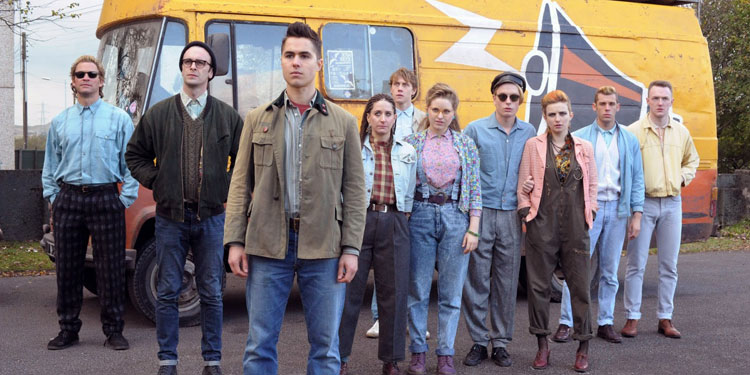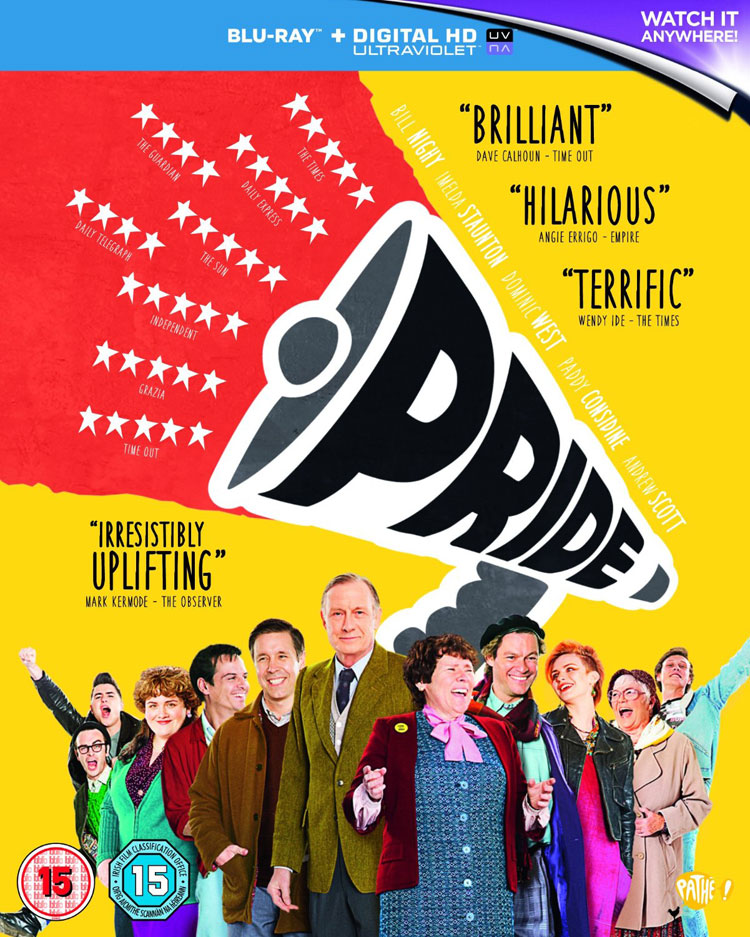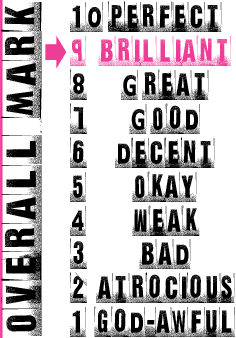
Director: Matthew Warchus
Running Time: 120 mins
Certificate: 15
Release Date: March 2nd 2015 (UK)

For many people Pride was one of the best films of 2014, if not the best. It’s well made, genuinely funny, angry, smart and heartfelt; and while tinged with tragedy, overall it’s astonishingly uplifting.
It’s the early 1980s and the National Union Of Miners is on strike due to theThatcher government’s decision to close a number of coal pits. The strike is dragging on and the nation is divided, including in London where a group of gays and lesbians decide to come together to raise cash for the miners. There’s a problem though, as when they try to donate the cash they find out that the Union and various other groups don’t want to take the money as they’d preferred not to be associated with a bunch of ‘poofs’. Although LGSM (Lesbians and Gays Support the Miners) could donate anonymously, de facto group leader Mark (Ben Schnetzer) is determined that gay people raised the cash and they should be able to donate without hiding their sexuality.
After numerous phone calls they come across a small Welsh mining village that appears willing to take their cash – although that’s only because the person on the other end of the phone doesn’t really hear who they are. This marks the start of a friendship that is initially fractious, but which sees two very different worlds colliding, where the big city gays and the rural villagers realise they may not be quite as opposite as they first appear – especially as both are communities that have found themselves fighting against the increasingly aggressive actions of an establishment that doesn’t want them around.
Not that many movies manage to be laugh-out-loud funny and genuinely moving at the same time, but Pride does just that, and then some. What’s particularly nice about it is that it has massive empathy and treats both the Londoners and the villagers on an equal level – both sides have something to teach the other, as long as they’re all willing listen and extend the hand of friendship.
Thankfully it doesn’t ignore the negatives, such as homophobia in both London and the Welsh Valleys, or that this was taking place at a time when a mysterious killer was starting to strike down gay men.
All this is helped by a tremendous cast who are given interesting, well-rounded characters to play. From Mark’s infectious, left wing social conscience and determination to do the right thing, to young Joe (George MacKay), who’s still in the closet and making his first steps into the gay world, they are wonderfully drawn people it’s a pleasure to be in the company of. It would have been easy to paint the villagers as yokel buffoons, but Pride goes the opposite way, particularly with the female characters, who are strong, proud and smart, even if the world looks at them as ladies who make sandwiches and gossip while their men are standing against the government on the picket lines.
Pride may not have any a-list movie stars amongst the cast, but first-time director Matthew Warchus went for quality, such as the always excellent Imelda Staunton and Bill Nighy as older villagers who aren’t initially sure what to make of the out and proud gay men and lesbians who arrive on their doorstep. Dominic West meanwhile gives a smartly judged turn as a camp gay man whose flamboyance is never used as the butt of the joke. There’s also Paddy Considine in a somewhat thankless role, but it’s one which is vital for being the person who helps bring the two sides together, and he does it extremely well. As if that weren’t enough there’s also Andrew Scott in a relatively small but extremely effective role as a gay man who originated from Wales and has his own feelings about how those who are different are treated there.
What is frustrating though is that it’s difficult to escape the sensation that if this wasn’t about ‘the gays’ this would have been a big hit, instead of a minor commercial success in the UK and a bit of a flop in the US. It’s a movie that has all the ingredients of what normally makes a Brit flick successful all around the world, with the only difference being that this one puts gay people front and centre. And these aren’t just nice, polite, gay-in-name-only movie homos, but defiantly gay ones whose sexuality has a slightly militant edge – something that’s not surprising in the face of a society that actively seems to hate them.
But unfortunately there are still a lot of people out there who won’t watch Pride because it is so out and proud and has no intention of hiding them (even if the US DVD cover tried).
Most of these avoiders aren’t even actively homophobic, they’d just see Pride as a film that’s not for them. That is ironic as this is a movie that brilliantly shows that groups who think they have nothing in common can come together and bond over a common cause. You’d think a genuinely entertaining movie would be an easy common cause to sell, but Pride has had a far tougher time than it ought to have had getting general audience to watch it.
The Blu-ray is well worth getting hold of, as the special features gives some background on the fascinating true story, as well as the making of the movie, which shows just what a good job they did of recreating the 1980s on a low budget.
Overall Verdict: Pride is the Best British Film of 2014 which everyone ought to watch. It’s laugh-out-loud funny and extremely moving, giving life to an inspiring and heart-breaking tale of worlds colliding in the best of ways.
Reviewer: Tim Isaac





Leave a Reply (if comment does not appear immediately, it may have been held for moderation)